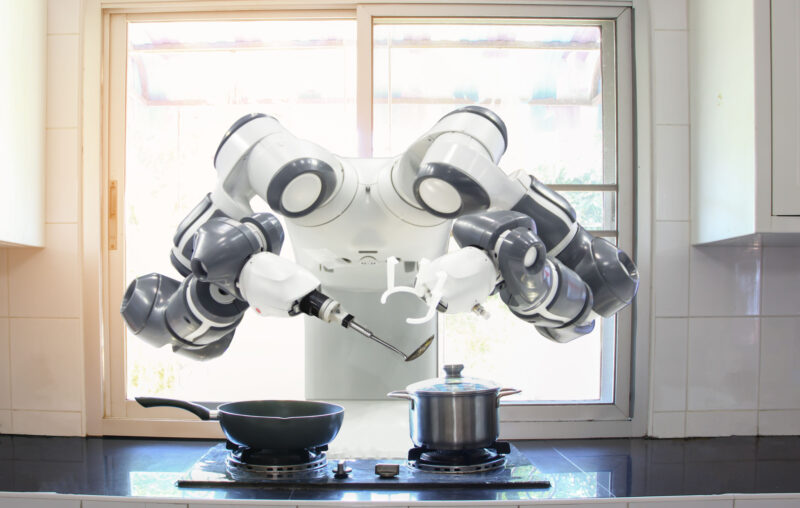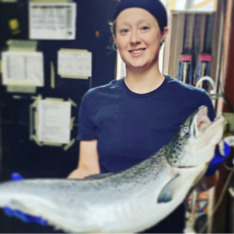


Artificial intelligence (AI) will disrupt the restaurant industry to an even greater degree than it has already. It will also enhance human creativity and improve our cuisine.
Disrupting and Enhancing the Restaurant Industry
Restaurant AI runs the gamut from high-speed information processing to generative AI systems. It can make reservation systems easier to operate, take orders (without error), and find new customers. It can even deliver pizzas and flip burgers. Such innovations apply to back-of-house operations, too, suggesting purchases, scheduling workers, and analyzing consumption trends.
For industries that support and employ 392,000 full-time chefs and head cooks and 70,000 hosts and hostesses (for 2022), these technologies are threatening. If AI can anticipate and perform many of the tasks people do, many people might be out of work. Why would restaurateurs continue to hire chefs, hosts, and other workers, when replacing them with AI robots and systems can lower average costs?
The unemployment effects of AI are worrisome, especially for workers who have dedicated their lives to service in the restaurant industry. There are many ways to temper such worries. People still have to discern whether AI outputs are appropriate for their goals. Generative AI systems can produce menu art all day long, for example, but chefs and restaurateurs make the final selection.
Customers also want human interaction as a part of their dining experience. They often want to be waited on by, or to ask questions of, a real person. For example, For Five Coffee and Conversation have built their dining experiences around human interactions.
The economic way of thinking and the concept of elasticity clarify this intuition and further temper our worries.
AI Technologies Depend on Economic Principles
Elasticity, in this case, refers to how employers change their willingness to employ workers as wages change. The more responsive employers are to wages, the more quickly they will adopt cheaper, labor-saving technology, or hire workers at lower wages.
Substitutability is one of the most important factors that determines how responsive employers are. The more closely AI resembles what a server, host, or chef can do, the more it can be a substitute. If AI technologies are close substitutes, employers will be less likely to hire those workers, who are relatively more expensive.
Consider a typical fast-food restaurant, where owners have a relatively elastic demand for workers. That is, there are many substitutes for fast food workers, namely other fast food workers and AI technologies that might provide similar services. AI technologies become closer substitutes for human workers as most fast-food products are standardized, and human interactions are limited. Such restaurants should be quick to adjust towards cheaper alternatives and “hire” more AI technologies.
Sit-down and table-service restaurants, however, have a relatively inelastic demand for chefs, hosts, and servers. The more chefs, hosts, and servers anticipate what diners might want, the more they provide human interaction and conversation, the more they can devise innovative cuisine, the more they can manage complex back-of-house operations, the fewer substitutes there are.
This notion of elasticity suggests then that AI might become more prevalent in fast-food restaurants whereas people will dominate sit-down restaurants. If you want to be a server, a host, or a chef, you want to make a career out of it, and you are worried about AI, hone your people skills, and develop services that cannot be easily replicated by AI.
AI Chefs
If AI robots can make food, the worries above stand. Chefs do much more, however, which is why their services are valuable. People value chefs for their knowledge and experience with food. The way chefs can make dishes and entire meals fit together — in ways most people and AI technologies cannot — indicates their value and their unique abilities.
Recent portrayals of chefs notwithstanding (see The Menu (2022) and The Bear (2022)), chefs care deeply about their dishes and the people they cook for. The skills and care for people are something AI doesn’t have. AI might be very good at rote tasks (as dictated by some predetermined program and mimicking speech, art, and sentiment) but people have a unique ability to find new ways to satisfy the wants of others and respond to changing circumstances.
Moreover, chefs manage complexity. In a kitchen, chefs perform myriad tasks at varying speeds, and manage to produce dishes and culinary experiences for dozens, if not hundreds or even thousands, of guests per day. Chefs manage this complexity by considering which tasks to prioritize and acting on such decisions, (preparing small plates before the main course, boiling water before cooking the steaks, and so on).
The fate of “Flippy”—an AI hamburger flipper at Chili’s—indicates this complexity and raises the question of whether AI can successfully replace humans in a kitchen. An earlier version of Flippy was “fired” (at least temporarily) because human cooks were unable to prepare the other food to match the speed of the grill. Every order placed in a restaurant takes a person to review orders, scan tickets, prioritize, and prepare every ingredient correctly in the right order to reach the table perfectly — along with multitasking the stream of orders before and after it. Human chefs, presumably, have the experience, skill, and muscle memory to better time and match orders with the performance of the entire kitchen staff.
Chefs, servers, and hosts often have a wide set of skills that cannot be easily replicated by AI technologies, which suggests fears of AI’s unemployment effects are overblown.
TELL YOUR FRIENDS ABOUT CITIZENS JOURNAL Help keep us publishing –PLEASE DONATE





